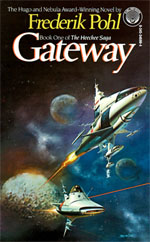September
4th, 2009
WHAT
I'M READING 68: GATEWAY

I often think of Gateway
as being the last great hurrah of the Golden Age of Science Fiction.
Although published in 1977, to me it has always felt like a Campbellian
classic -- as if it should be a contemporary of Childhood's End
or the Foundation Trilogy.
A throwback to the 1950's.
I probably wouldn't have that impression if
I had been reading science fiction when Gateway was
published, but there it is.
And there's really no denying, in my
opinion, that Gateway's
crowning achievement is the perfect melding of multiple branches of the
science fiction tree.
On
the one hand there is the Big Concept: The Gateway itself. A concept so
breathtakingly original that people have been imitating it ever since.
(Basically, it goes like this: Humans find a space station abandoned by
aliens. Inside they find hundreds of ships. They don't know how the
ships work, but they can operate the auto-pilot. Brave prospectors
board the ships, hit a button, and go God-knows-where in the search for
Heechee technology.)
Hidden within that Big Concept are the hints
of space opera: Small bands of adventurous heroes journeying into the
unknown on missions of thrilling exploration.
But while Pohl
teases us with the structure of space opera, he weds it to the best
literary traditions of hard science fiction: His prospectors are
exploring the cold, hard worlds and braving the impossible terrors laid
bare by the cutting edge of science. And rather than proving
indulgences, the carefully extrapolated detail of the milieu is instead
used to provide dramatic sauce for the goose.
Meanwhile, wrapped
around all of this, Pohl is tapping the alternative literary structures
and deep, psychological characterizations of the New Wave to illuminate
the personal struggles of Robin Broadhead, one of the richest and most
rewarding characters in science fiction.
The plot of Gateway
doesn't merely happen; it is made painfully relevant by the effect it
has on Broadhead. Indeed, the greatest triumph of the novel is the
creation of Broadhead: A deeply sympathetic, flawed, and yet (on some
very real level) noble human being. His transformation -- revealed
through complex and interwoven flashbacks and flashforwards -- is the
heart and soul of the book, lending true meaning to the amazing
universe that Pohl has crafted.
In short, Gateway pushes all
the buttons. It's a true highlight of what the science fiction genre is
capable of achieving.
GRADE:
A+
| 
